Reading2
- 格式:ppt
- 大小:1.09 MB
- 文档页数:36
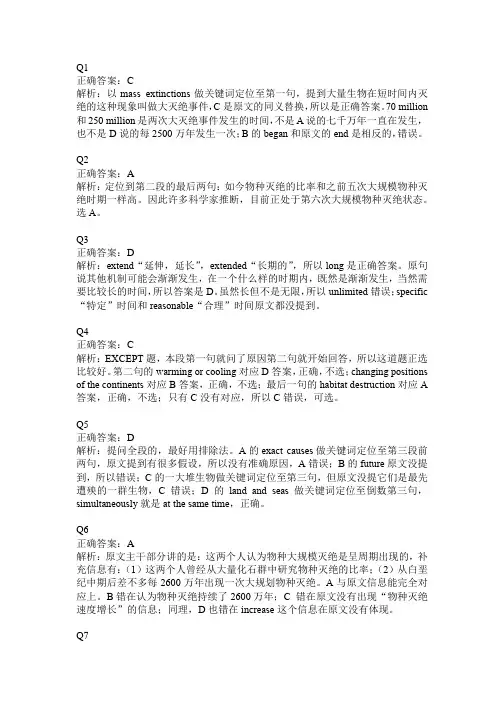
Q1正确答案:C解析:以mass extinctions做关键词定位至第一句,提到大量生物在短时间内灭绝的这种现象叫做大灭绝事件,C是原文的同义替换,所以是正确答案。
70 million 和250 million是两次大灭绝事件发生的时间,不是A说的七千万年一直在发生,也不是D说的每2500万年发生一次;B的began和原文的end是相反的,错误。
Q2正确答案:A解析:定位到第二段的最后两句:如今物种灭绝的比率和之前五次大规模物种灭绝时期一样高。
因此许多科学家推断,目前正处于第六次大规模物种灭绝状态。
选A。
Q3正确答案:D解析:extend“延伸,延长”,extended“长期的”,所以long是正确答案。
原句说其他机制可能会渐渐发生,在一个什么样的时期内,既然是渐渐发生,当然需要比较长的时间,所以答案是D。
虽然长但不是无限,所以unlimited错误;specific “特定”时间和reasonable“合理”时间原文都没提到。
Q4正确答案:C解析:EXCEPT题,本段第一句就问了原因第二句就开始回答,所以这道题正选比较好。
第二句的warming or cooling对应D答案,正确,不选;changing positions of the continents对应B答案,正确,不选;最后一句的habitat destruction对应A 答案,正确,不选;只有C没有对应,所以C错误,可选。
Q5正确答案:D解析:提问全段的,最好用排除法。
A的exact causes做关键词定位至第三段前两句,原文提到有很多假设,所以没有准确原因,A错误;B的future原文没提到,所以错误;C的一大堆生物做关键词定位至第三句,但原文没提它们是最先遭殃的一群生物,C错误;D的land and seas做关键词定位至倒数第三句,simultaneously就是at the same time,正确。
Q6正确答案:A解析:原文主干部分讲的是:这两个人认为物种大规模灭绝是呈周期出现的,补充信息有:(1)这两个人曾经从大量化石群中研究物种灭绝的比率;(2)从白垩纪中期后差不多每2600万年出现一次大规划物种灭绝。

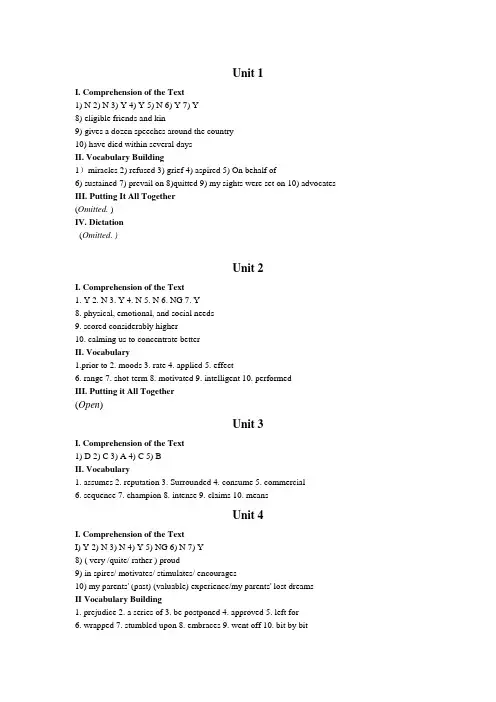

Part 1 Word Dictation<每小题:1 分>Directions: Listen and write down the words you hear. You are going to listen to the recording twice. During the first time, write the word that you hear. Check your answers as you listen the second time.1.2.3.4.5.6.7.8.9.10.11.12.13.14.15.16.17.18.19.20.Part 2 Understanding Long Conversations<每小题:1 分>Directions: In this section you'll hear a long conversation or conversations. Listen carefully and choose the best answer to the questions you hear.Questions 1 to 5 are based on the same passage or dialog. 1.A. Both of them have many pieces of equipment.B. Both of them have started playing tennis.C. Neither of them knows how to ski at all.D. Neither of them likes to use sports equipment.2.A. She says the skis are always in the closet.B. She says he has never learned how to.C. She says there is a lot of dust on the skis.D. She says he only watches skiing on TV.3.A. She gave him new skis.B. She gave him a tennis racket.C. She gave him basketball shoes.D. She gave him a basketball.4.A. They don't have enough time or money.B. They don't have enough equipment or money.C. They don't have enough time for TV or radio.D. They don't have enough time or the right equipment.5.A. To make their husbands exercise.B. To give away all of their equipment.C. To help their husbands relax more.D. To stop buying things for them.Questions 6 to 10 are based on the same passage or dialog. 6.A. He is reading a story in the newspaper.B. He isn't smiling when she sees him.C. He is telling a story about his favorite athlete.D. He is listening to bad news from a friend.7.A. Sports writers didn't mention Jim Abbott as being a topB. Sports writers wrote that Jim Abbott was not a goodC. Sports writers made strange choices about top players.D. Sports writers forgot that Jim Abbott was a special player.8.A. He had passion.B. He played well.C. He had only one hand.D. He had many difficulties.9.A. A game that Jim Abbott played.B. Sports writers forgetting about Jim Abbott.C. The inside of Yankee Stadium.D. Jim Abbott's career over the years.10.A. Become a sports writer.B. Become a great baseball player.C. Tell Jim Abbott thank you.D. Write a letter to the newspaper.Questions 11 to 15 are based on the same passage or dialog.11.A. Because she didn't train very hard.B. Because she was too excited.C. Because she wasn't really good.D. Because the other players were very good.12.A. Some friends she hadn't seen in a while.B. Some of her favorite tennis players.C. Some famous people of foreign nations.D. Some people who helped improve her skills.13.A. Carrying the national flag at the ceremony.B. Playing against some of the greatest athletes in her sport.C. Having her country's national anthem played afterD. Seeing people from around the world together in one14.A. She won the gold medal in the Olympic Games.B. She could meet the greatest players and play againstC. She could see people from all over the world together.D. She could feel proud of her country and try to win glory.15.A. Playing tennis as often as before.B. Staying busy and active in her life.C. Meeting the public every day.D. Keeping her public commitments.Part 3 Understanding Passages<每小题:1 分>Directions: In this section you'll hear a passage or passages. Listen carefully and choose the best answer to the questions you hear.Questions 1 to 5 are based on the same passage or dialog. 1.A. It involves many great athletes.B. It takes great strength and courage.C. It is made up of three parts.D. It tests the worth of a person as an athlete.2.A. Swimmer 2 will stay in front.B. Swimmer 4 will never have the lead.C. Swimmer 3 is going to win.D. Swimmer 1 will be the winner.3.A. Racer 1 would be very fast.B. Racer 2 would be very fast.C. Racer 3 would be very fast.D. Racer 4 would be very fast.4.A. It is very close between 2 and 4.B. It is too hard for anyone to finish.C. It is likely to be won by any racer.D. It is not very close, as 2 is way ahead.5.A. He has some energy left.B. He is kicking hard to win.C. He is close to the end.D. He has 100 meters to go.Questions 6 to 10 are based on the same passage or dialog. 6.A. To help the athlete choose the right team to play for.B. To help the athlete accomplish as much as possible.C. To help the athlete decide which sport to play.D. To help the athlete avoid big losses and failures.7.A. They have their own ideas about what's best.B. They have been told from players which to use.C. They have studied different techniques at school.D. They have experience seeing techniques at work.8.A. By keeping athletes from their limits.B. By giving the athletes classes in protection.C. By using warm up activities, tapes, and wraps.D. By making sure the athletes are active.9.A. He will make sure that the player gets the best help.B. He will show how to avoid injury next time.C. He will remove the player from the game right away.D. He will take care of it himself with his training.10.A. They always help them beat their opponents.B. They teach them how to play the game well.C. They make a difference by giving advice.D. They are necessary in achieving success.Questions 11 to 15 are based on the same passage or dialog.11.A. To help athletes develop strength.B. To help athletes become friends.C. To become faster, higher and stronger.D. To honor the Greek god, Zeus.12.A. They stopped the Olympic Games.B. They added more games to the Olympics.C. They invited 8 more countries to join.D. They hosted the first modern Olympics.13.A. To honor Greece and the city of Athens.B. To have countries compete with each other.C. To create a new symbol for world friendship.D. To help athletes become stronger by competing.14.A. The modern Olympic Games.B. Some new Olympic sports.C. The Olympic symbol of 5 rings.D. The linking of sports groups.15.A. The saying "faster, higher and stronger".B. The friendship gained through sports.C. The colors blue, yellow, black, green and red.D. The five foot races in the first Greek OlympicsPart 4 Vocabulary and Structure<每小题:1 分>Directions: Choose the best answer from the four choices marked A, B, C and D.1.When people admire his ________ achievements, they seldomthink of the frustration he has experienced.A. singleB. singularC. smallD. easy2.Everyone is amazed at the _________ growth of this city; it hasbeen so different from what it was five years ago.A. explosiveB. expandingC. expensiveD. excessive3.Jack is a strong __________, but you could beat him if youperform at your highest level.A. opponentB. partnerC. friendD. mate4.Though he didn't answer my questions quickly, the look onhis face ___________ that he was satisfied with me.A. indicatedB. inputC. increasedD. interacted5.Having lost his job and his family, Jerry felt himself __________by anger and sadness.A. experiencedB. overcomeC. experienceD. overcame6.In the geography class, the teacher explained wind and watermight cause soil ____________.B. excellenceC. explosionD. erosion7.The __________ of this recipe <烹饪法> was made public oneyear after it was put into the market.A. formulaB. formC. flavorD. frown8.Lots of birds were flying among the trees branches. Whata<n> ___________ view!A. explosiveB. amusedC. amazingD. terrified9.The woman with golden hair was taken away by the securityguards on __________ of being a criminal.A. suspectC. doubtD. belief10.We will spare no efforts to provide more ___________ productsto our customers.A. competitiveB. competingC. competedD. competition11.Having been on the ____________ for the whole month, thecriminal decided to turn himself in to the police.A. escapedB. caughtC. wayD. run12.The man with ____________ strength could lift a heavy rockwithout any difficulty.A. powerfulB. strongD. phenomenal13.Seeing that the last bus was leaving, he made a ____________for it while shouting "Wait! Wait!"A. driveB. dashC. raceD. relay14.We all ___________ violence against women, old and young.A. unfairB. againstC. condemnD. persist15.There is no ____________ that he was once a thief. But itdoesn't mean you can always regard him as a thief.A. denyB. deniedC. deniesD. denying16.Hearing a _____________ noise in the backyard, Pamela wentthere to have a look.A. crackingB. crackC. crackedD. cracker17.If we carry out our plan with _____________, we will surelyachieve our goal sooner or later.A. conditionsB. determinationC. competitionD. frowns18.Some of the passengers escaped serious ____________ in thetraffic accident.A. enquiryB. woundC. inquiryD. injury19.Having ___________ the bear in the woods for one week, theman was almost out of food.A. caughtB. shotC. trailedD. seeking20.Jessica ____________ her father on the knee and asked him notto worry about his health.A. pattedB. struckC. strokedD. paced21.I was surprised to see the little girl play the piano so skillfully;she must have a<n> ___________ future in music.A. promisedB. processedC. promisingD. processing22.Sherry is a member of a<n> ___________ dramatic club. Shegoes there after work for practice twice a week.B. amusingC. assertiveD. amateur23.With the price ___________, the fruits are selling much betternow.A. loweringB. is loweredC. having been loweredD. is being lowered24.Our university celebrated its 100th ___________ the year beforelast.A. anniversaryB. birthdayC. yearD. birth25.Jane sometimes complains that her husband is not___________ enough. He never thinks of buying her any gift on special days.B. romanticC. assertiveD. restless26.If you are always ____________ to others' troubles, you won'tget any help whenever you are in trouble yourself.A. indifferentB. regretfulC. romanticD. phenomenal27.Having walked in the hot sun for most of the day without anywater, the man felt ____________.A. fatiguingB. having fatiguedC. fatiguedD. to have fatigued28.After a<n> ___________ rise in prices of daily purchases,people feel that money is tight.A. acceptableB. expensiveC. massiveD. explosion29.They took a taxi to meet you at the hotel just now, so theywill arrive ____________ half an hour later if there is no traffic on the way.A. hardlyB. approximatelyC. instantlyD. lately30.The ____________ army was commanded by a general who hadalways been dissatisfied with the king.A. romanticB. determiningC. rebelliousD. competitivePart 5 Skimming and Scanning <Multiple Choice+Blank Filling><每小题:1 分>Directions: Read the following passage or passages and thenanswer the questions. For the first 7 questions in each passage, choose the best answer from the four choices marked A, B, C and D. For the remaining 3 questions in the same passage, complete the sentences with the information given in the passage.Questions 1 to 10 are based on the same passage or dialog. Studying in a Foreign CountryStudying in Seville, Spain was probably the most exciting and useful learning experience of my college career.I lived with a Spanish family during my study at the Center for Cross-Cultural Study in Seville. My best friend, Lily, came with me.I remember arriving at the Center the first day, assuming the staff there would take us to meet the family we were to stay with and get us settled. Instead, they handed us a piece of paper with the address and put us in a taxi. I remember how scared I was. All of a sudden I was across the ocean in a city I didn't know, and I was losing confidence in my Spanish skills quickly while trying to speak with the taxi driver.As soon as we arrived at our new home in Spain, however, I knew that I was going to spend a happy, comfortable three weekslearning and exploring. We met the mother of the family we would stay with. Her name is Fina, and she greeted us warmly with a kiss on each cheek. She shares a beautiful apartment with her two daughters, Maribel and Laura. After meeting them, I was no longer worried about things.After that first day, Lily and I were ready to explore. We went down to the bus stop and bought a month long pass so that we could easily get around the city. The people of Seville were so friendly and we simply asked a passerby for directions whenever we needed them. I quickly gained confidence in my Spanish again as I practiced more and more every day. Lily and I began to grow used to Spanish life. One of the happiest moments on my trip occurred during the last week in Seville. Lily and I were walking down the street going shopping, when a Spaniard stopped to ask us for directions!The culture there is so wonderful that it is hard to want to live any other way. After the busy life in the United States, I actually had to make myself slow down. One of the things that I loved most about Spain was the fact that there is no fast food. Before school every morning, I would of course wake up too late. Then we would rushdown to the bus which we could take half-way to class.The class itself was a very exciting learning experience for me. I was so proud of myself to have taken a class entirely in Spanish, and understood what was going on. I loved the change of pace and challenged myself. My professor was a wonderful man, and made the three-hour class fly by. He had so many interesting stories about Spanish culture and life.One of the things I loved most about being in another country was meeting people from all over the world. We met students from Britain, Australia, Morocco, France, Germany, and many other countries. It was a lot of fun talking with people from so many different backgrounds and perspectives. It is hard to imagine people living so differently from the way we do in our little state of Pennsylvania.This experience is going to be helpful to my teaching because it has made me more open-minded and bold <勇敢的>. I learned that the way I am used to doing things is not always the best way. The more different perspectives and backgrounds that we can experience, the more we can learn.1.The writer's experience in Spain ________________.A. was useful in teaching her to learnB. was very helpful for herC. was her most exciting experienceD. was the start of her career2.When she arrived at the Center the first day, she expected________________.A. to meet her best friend, LilyB. to be taken to a family by the staffC. to be scared in a city she didn't knowD. to get the address to her new home3.After meeting the family, she ________________.A. did not feel worriedB. did not share the apartmentC. did not learn and exploreD. did not greet them warmly4.The writer and her friend Lily bought a month long pass forthe bus so that ________________.A. they could make friendsB. the writer could practice her SpanishC. they could explore the city easilyD. they didn't need to ask for directions5.It made the writer and Lily very happy and excited when________________.A. they practiced Spanish every dayB. a Spaniard asked them for directionsC. they did a lot of shopping in SpainD. they would stop to ask directions6.What is the thing about Spain that impressed and pleasedthe writer most? ________________A. she could go shopping oftenB. she could go to school lateC. she could not see any fast foodD. she could not wake up late7.The writer felt very proud of herself, because ________________.A. she understood her Spanish classB. she was told she was wonderfulC. she was very exciting in SpainD. she had many interesting stories8.Her professor had many interesting stories to tell, and made9.One of the things the author loved most was talking with10.She believed that her learning experience in a foreigncountry would benefit her teaching a lot because it has madePart 6 Reading Comprehension <Multiple Choice><每小题:1 分>Directions: Read the following passages carefully and choose the best answer from the four choices marked A, B, C and D. Questions 1 to 5 are based on the same passage or dialog. English food is thought of poorly in other countries. This is most probably because foreigners in England are often obliged <不得不> to eat in the more fast-food type of restaurant. Here it is necessary to prepare food rapidly in large amounts, and the taste of the food inevitably suffers, though its quality, from the point of view of nourishment <营养>, is quite satisfactory. Still, it is rather dull and not always pleasantly presented. Moreover, the Englishman eating in a cheap or medium price restaurant is usually in a hurry <at least at lunch>, and a meal eaten in a leisurely way in pleasant surroundings is always far moreenjoyable than a meal taken quickly in a business-like environment. In general, it is possible to get a good meal at a reasonable price; in fact, such a meal may be less expensive than similar food in other countries. For those with money to spare, there are restaurants that compare favorably with the best in any country.In many countries breakfast is a snack <点心> rather than a meal, but the typical English breakfast is a full meal. Some people have a bowl of hot or cold cereal<谷物> to begin with. Then comes a large and filling course, usually cooked, such as bacon <腊肉> and eggs, or some other type of meat. Yorkshire ham <火腿> is also a breakfast many people enjoy. Afterwards comes toast, with butter and marmalade <果子酱>, and perhaps some fruit. Tea or coffee is drunk with the meal. Many English people now take such a full breakfast only on Sunday morning.1.Food in the more fast-food type of restaurant in Britain isalways _____________.A. served in large amountsB. very pleasant in appearanceC. quite acceptable for foreignersD. not so delicious2.According to the passage, English food is _______________ interms of nourishment.A. actually quite satisfactoryB. not good at allC. always very simpleD. always taken in pleasant surroundings despite its poor3.Foreigners in Britain always choose to ____________________.A. eat the most typical foodB. have a full breakfast every dayC. buy the least expensive foodD. have their meals in the more fast-food type of restaurant4.Which of the following statements is probably true?A. Englishmen always talk about time while eating.B. The same meal would be more enjoyable if eaten in betterC. It's almost impossible for any British restaurant to rankD. People can hardly get enough food at a reasonable price5.Which of the following statements is probably NOT true?A. Many Englishmen have a full breakfast only once a week.B. Typical breakfast in Britain is a meal rather than a snack.C. Englishmen are so stuck in their old ways that they have aD. English people always have tea or coffee with a fullQuestions 6 to 10 are based on the same passage or dialog.In the United States, work is influenced by laws. Laws affect how long people work, what they are paid, and the conditions under which they work. To see how important work laws are, just look back to the year 1900. At that time, there were few laws about working conditions.In those days, people would work for months and then find that the money they made had been cut. If they complained, they were fired. If they became sick, it was just too bad. There were no paid sick days and no health plans.Some factories at that time were dark, crowded, and generally awful places to work in. People in these factories worked12-to-18-hour shifts, 6 days a week for very little money. Most ofthe workers were women and children. In those days, women were generally paid half of what men were paid for doing exactly the same work. Children were given even less, so naturally, factory owners preferred hiring children. There were no health or safety laws to protect the workers. People fainted from the heat and lack of air.It took a very sad event to start getting changes. That sad event was the Triangle Fire. In 1911, the Triangle Building in New York City caught fire. The building was a dangerous place. Still, 145 people would not have died if the factory owner had not locked the doors. He did not want his workers to waste time by going outside to rest, so he locked them in. During the fire, a number of young women jumped out of the windows and died on the street. The others died inside.As a result, some important safety and health laws were passed. Now there are also laws to prevent child labor and laws to make sure that there is equal pay for equal work. Among other things, there is a limit to the number of hours in the workday and there isa minimum amount that workers must be paid.6.In America, _________________.A. laws have little influence on workB. people couldn't work without lawsC. people couldn't work without lawsD. people can change laws easily7.In the old days, if workers made complaints, they would___________.A. have their health plans taken awayB. find their money cutC. lose their jobsD. be given terrible places to work8.Factory owners preferred hiring children because_____________.A. children eat lessB. they could manage children betterC. children could do adults' workD. they paid children much less money9.Some changes took place as a result of _____________.A. a traffic accidentB. a serious diseaseC. the death of many workers in a fireD. a strike by the workers10.Now there are laws for all of the following except ___________.A. allowing workers to take holidaysB. preventing children from being employedC. making sure that there is equal pay for equal workD. limiting work hours。
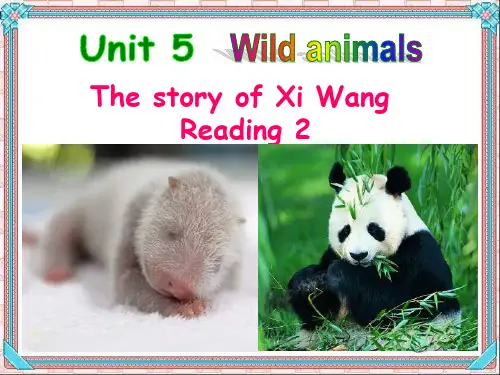

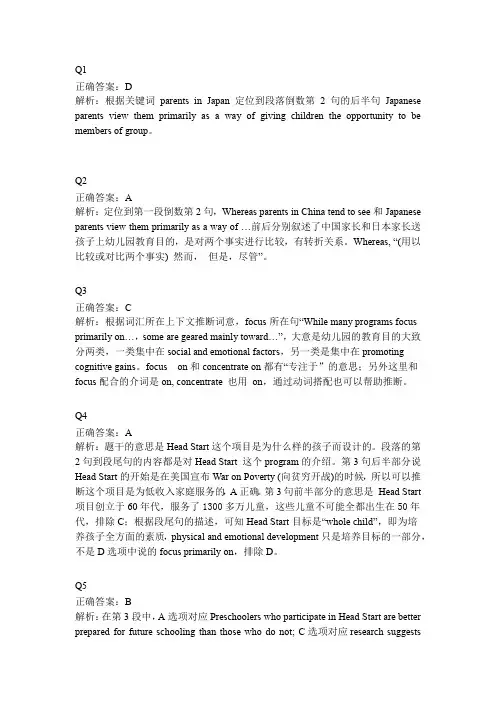
Q1正确答案:D解析:根据关键词parents in Japan定位到段落倒数第2句的后半句Japanese parents view them primarily as a way of giving children the opportunity to be members of group。
Q2正确答案:A解析:定位到第一段倒数第2句,Whereas parents in China tend to see和Japanese parents view them primarily as a way of …前后分别叙述了中国家长和日本家长送孩子上幼儿园教育目的,是对两个事实进行比较,有转折关系。
Whereas, “(用以比较或对比两个事实) 然而,但是,尽管”。
Q3正确答案:C解析:根据词汇所在上下文推断词意,focus所在句“While many programs focus primarily on…,some are geared mainly toward…”,大意是幼儿园的教育目的大致分两类,一类集中在social and emotional factors,另一类是集中在promoting cognitive gains。
focus on和concentrate on都有“专注于”的意思;另外这里和focus配合的介词是on, concentrate 也用on,通过动词搭配也可以帮助推断。
Q4正确答案:A解析:题干的意思是Head Start这个项目是为什么样的孩子而设计的。
段落的第2句到段尾句的内容都是对Head Start 这个program的介绍。
第3句后半部分说Head Start的开始是在美国宣布War on Poverty (向贫穷开战)的时候,所以可以推断这个项目是为低收入家庭服务的,A正确。
第3句前半部分的意思是Head Start 项目创立于60年代,服务了1300多万儿童,这些儿童不可能全都出生在50年代,排除C;根据段尾句的描述,可知Head Start目标是“whole child”,即为培养孩子全方面的素质,physical and emotional development只是培养目标的一部分,不是D选项中说的focus primarily on,排除D。
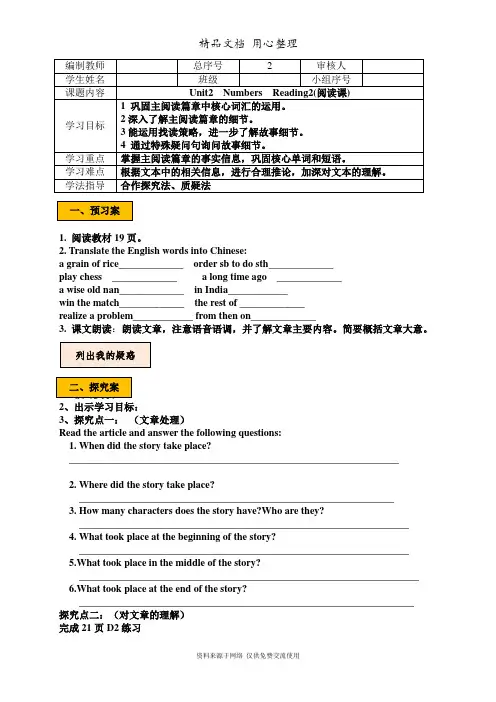
1. 阅读教材19页。
2. Translate the English words into Chinese:a grain of rice_____________ order sb to do sth_____________play chess _____________ a long time ago _____________a wise old nan_____________ in India____________win the match_____________ the rest of _____________realize a problem____________ from then on_____________3. 课文朗读:朗读文章,注意语音语调,并了解文章主要内容。
简要概括文章大意。
2、出示学习目标:3、探究点一:(文章处理)Read the article and answer the following questions:1. When did the story take place?__________________________________________________________________2. Where did the story take place?_______________________________________________________________3. How many characters does the story have?Who are they?__________________________________________________________________4. What took place at the beginning of the story?__________________________________________________________________5.What took place in the middle of the story?____________________________________________________________________ 6.What took place at the end of the story?___________________________________________________________________探究点二:(对文章的理解)完成21页D2练习探究点三:(对文章知识点的归纳整理)(1)要点归纳1. a long time ago 很久以前=long ago=long long ago=once upon a time2. wise adj.“聪明的,明智的”。
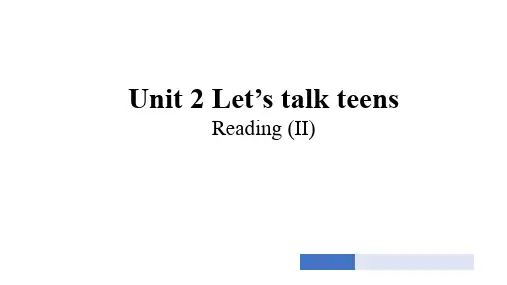
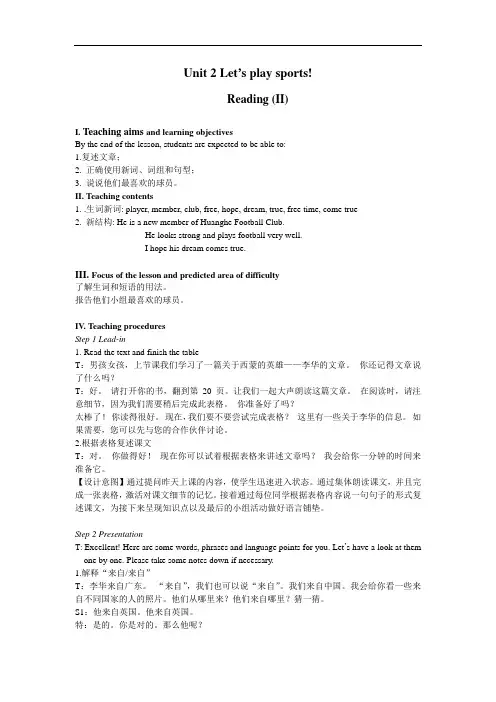
Unit 2 Let’s play sports!Reading (II)I. Teaching aims and learning objectivesBy the end of the lesson, students are expected to be able to:1.复述文章;2. 正确使用新词、词组和句型;3. 说说他们最喜欢的球员。
II. Teaching contents1..生词新词: player, member, club, free, hope, dream, true, free time, come true2. 新结构: He is a new member of Huanghe Football Club.He looks strong and plays football very well.I hope his dream comes true.III. Focus of the lesson and predicted area of difficulty了解生词和短语的用法。
报告他们小组最喜欢的球员。
IV. Teaching proceduresStep 1 Lead-in1. Read the text and finish the tableT:男孩女孩,上节课我们学习了一篇关于西蒙的英雄——李华的文章。
你还记得文章说了什么吗?T:好。
请打开你的书,翻到第20 页。
让我们一起大声朗读这篇文章。
在阅读时,请注意细节,因为我们需要稍后完成此表格。
你准备好了吗?太棒了!你读得很好。
现在,我们要不要尝试完成表格?这里有一些关于李华的信息。
如果需要,您可以先与您的合作伙伴讨论。
2.根据表格复述课文T:对。
你做得好!现在你可以试着根据表格来讲述文章吗?我会给你一分钟的时间来准备它。
【设计意图】通过提问昨天上课的内容,使学生迅速进入状态。
通过集体朗读课文,并且完成一张表格,激活对课文细节的记忆。
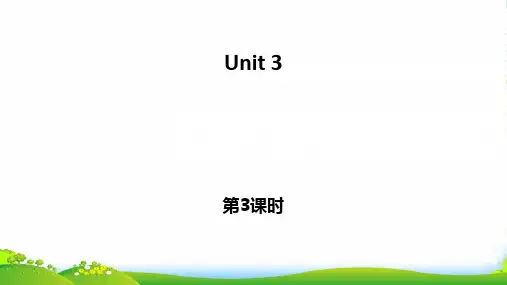
牛津译林版英语七下Unit 2《Neighbours》(Reading 2)说课稿一. 教材分析《Neighbours》(Reading 2)是牛津译林版英语七年级下册Unit 2的一篇阅读文章。
文章介绍了一对夫妇与他们的邻居之间的关系,通过描述他们之间的互动,引导学生关注邻里之间的和谐相处。
文章内容贴近学生的生活,有助于激发学生的学习兴趣,提高他们的阅读理解能力。
二. 学情分析七年级的学生已经具备了一定的英语基础,能够理解和运用一些基本的英语句型。
但他们在阅读理解方面还存在一定的困难,特别是对于长篇文章的理解和分析能力。
因此,在教学过程中,需要关注学生的阅读策略和技巧的培养,提高他们的阅读理解能力。
三. 说教学目标1.知识目标:学生能够掌握文章中的重点词汇和句型,理解文章的基本内容。
2.能力目标:学生能够运用阅读策略和技巧,提高阅读理解能力。
3.情感目标:学生能够认识到邻里之间和谐相处的重要性,培养良好的邻里关系。
四. 说教学重难点1.重点:文章中的重点词汇和句型。
2.难点:学生对于文章深层含义的理解和分析。
五. 说教学方法与手段1.教学方法:采用任务型教学法,让学生在完成任务的过程中,提高阅读理解能力。
2.教学手段:利用多媒体课件,图片,视频等辅助教学。
六. 说教学过程1.导入:通过展示一幅邻里和谐的图片,引导学生思考邻里关系的重要性,激发学生的学习兴趣。
2.阅读理解:学生自主阅读文章,回答相关问题,培养学生的阅读策略和技巧。
3.词汇学习:教师引导学生学习文章中的重点词汇和句型,帮助学生巩固基础知识。
4.深入分析:学生分组讨论,分析文章的深层含义,提高学生的思维能力。
5.小组活动:学生分组进行角色扮演,模拟邻里之间的互动,培养学生的实际应用能力。
6.总结:教师引导学生总结文章的主要内容和邻里和谐相处的重要性。
七. 说板书设计板书设计主要包括文章标题《Neighbours》,重点词汇和句型,以及邻里和谐相处的重要性。
智课网IELTS备考资料剑桥雅思5test2reading2的阅读全文解析摘要:烤鸭在看剑桥雅思5时,如果看到不懂的内容,不要着急,今天小马小编带来剑桥雅思5test2reading2的阅读全文解析,希望能解答您心中的疑问。
赶快看看下面的精彩内容吧。
大家都知道,剑桥雅思是很好的备考雅思书籍资料,既然这套资料那么好,我们应该好好利用,今天小马小编为大家带来的是剑桥雅思5test2reading2的阅读全文解析,希望能帮助大家更好的备考雅思考试。
What's so funny?John McCrone reviews recent research on humourYou should spend about 20 minutes on Questions 14-27, which are based on Reading Passage 21.The joke comes over the headphones: 'Which side of a dog has the most hair? The left ‘No, not funny. Try again’. Which side of a dog has the most hair? The outside.' Hah! The punchline is silly yet fitting, tempting a smile, even a laugh. Laughter has always struck people as deeply mysterious, perhaps pointless. The writer Arthur Koestler dubbed it the luxury reflex: 'unique in that it serves no apparent biological purpose'.2.Theories about humour have an ancient pedigree. Plato expressed the idea that humour is simply a delighted feeling of superiority over others. Kant and Freud felt that joke-telling relies on building up a psychic tension which is safely punctured by the ludicrousness of the punchline. But most modern humour theorists have settled on some version of Aristotle's belief that jokes are based on a reaction to or resolution of incongruity, when the punchline is either nonsense or, though appearing silly, has a clever second meaning.3.Graeme Ritchie, a computational linguist in Edinburgh, studies the linguistic structure of jokes in order to understand not only humour but language understanding and reasoning in machines. He says that while there is no single format for jokes, many revolve around a sudden and surprising conceptual shift. A comedian will present a situation followed by an unexpected interpretation that is also apt.4.So even if a punchline sounds silly, the listener can see there is a clever semantic fit and that sudden mental 'Aha!' is the buzz that makes us laugh. Viewed from this angle, humour is just a form of creative insight, a sudden leap to a new perspective.5.However, there is another type of laughter, the laughter of social appeasement and it is important to understand this too. Play is a crucial part of development in most young mammals. Rats produce ultrasonic squeaks to prevent their scuffles turning nasty. Chimpanzees have a 'play-face' - a gaping expression accompanied by a panting 'ah, ah' noise. Inhumans, these signals have mutated into smiles and laughs. Researchers believe social situations, rather than cognitive events such as jokes, trigger these instinctual markers of play or appeasement. People laugh on fairground rides or when tickled to flag a play situation, whether they feel amused or not.6.Both social and cognitive types of laughter tap into the same expressive machinery in our brains, the emotion and motor circuits that produce smiles and excited vocalizations. However, if cognitive laughter is the product of more general thought processes, it should result from more expansive brain activity.7.Psychologist Vinod Goel investigated humour using the new technique of 'single event' functional magnetic resonance imaging (fMRI). An MR! scanner uses magnetic fields and radio waves to track the changes in oxygenated blood that accompany mental activity. Until recently, MRI scanners needed several minutes of activity and so could not be used to track rapid thought processes such as comprehending a joke. New developments now allow half-second'snapshots' of all sorts of reasoning and problem-solving activities.8.Although Goel felt being inside a brain scanner was hardly the ideal place for appreciating a joke, he found evidence that understanding a joke involves a widespread mental shift. His scans showed that at the beginning of a joke the listener's prefrontal cortex lit up, particularly the right prefrontal believed to be critical for problem solving. But there was also activity in the temporal lobes at the side of the head (consistent with attempts to rouse stored knowledge) and in many other brain areas. Then when the punchline arrived, a new area sprang to life - the orbital prefrontal cortex. This patch of brain tucked behind the orbits of the eyes is associated with evaluating information.9.Making a rapid emotional assessment of the events of the moment is an extremely demanding job for the brain, animal or human. Energy and arousal levels may need to be retuned in the blink of an eye. These abrupt changes will produce either positive or negative feelings. The orbital cortex, the region that becomes active in Goel's experiment, seems the best candidate for the site that feeds such feelings into higher-level thought processes, with its close connections to the brain's sub-cortical arousal apparatus and centres of metabolic control.10.All warm-blooded animals make constant tiny adjustments in arousal in response to external events, but humans, who have developed a much more complicated internal life as a result of language, respond emotionally not only to their surroundings, but to their own thoughts. Whenever a sought-for answer snaps into place, there is a shudder of pleased recognition. Creative discovery being pleasurable, humans have learned to find ways of milking this natural response. The fact that jokes tap into our general evaluative machinery explains why the line between funny and disgusting, or funny and frightening, can be so fine. Whether a joke gives pleasure or pain depends on a person's outlook.11.Humour may be a luxury, but the mechanism behind it is no evolutionary accident. As Peter Derks, a psychologist at William and Mary College in Virginia, says: 'I like to think of humour as the distorted mirror of the mind. It's creative, perceptual, analytical and lingual. If we can figure out how the mind processes humour, then we'll have a pretty good handle on how it works in general.'Questions 14-20Do the following statements agree with the information given in Reading Passage 2?In boxes 14-20 on your answer sheet, writeTRUE if the statement agrees with the informationFALSE if the statement contradicts the informationNOT GIVEN if there is no information on this14 Arthur Koestler considered laughter biologically important in several ways. F15 Plato believed humour to be a sign of above-average intelligence. NG16 Kant believed that a successful joke involves the controlled release of nervous energy. T17 Current thinking on humour has largely ignored Aristotle's view on the subject. F18 Graeme Ritchie's work links jokes to artificial intelligence. T19 Most comedians use personal situations as a source of humour. NG20 Chimpanzees make particular noises when they arc playing. TQuestions 21-23The diagram below shows the areas of the brain activated by jokes. Label the diagram.Choose NO MORE THAN TWO WORDS from the passage for each answer.Write your answers in boxes 21 -23 on your answer sheet.21.Problem solving 22.temporal lobes 23.evaluating informationQuestions 24—27Complete each sentence with the correct ending A-G below.Write the correct letter A-G in boxes 24-27 on your answer sheet.24 One of the brain's most difficult tasks is to C25 Because of the language they have developed, humans A26 Individual responses to humour F27 Peter Derks believes that humour DAreact to their own thoughts.Bhelped create language in humans.Crespond instantly to whatever is happening.Dmay provide valuable information about the operation of the brain.Ecope with difficult situations.Frelate to a person's subjective views.Gled our ancestors to smile and then laugh.这篇文章虽然看起来比较贴近生活,但是理解起来还是有一定难度的,而且生词也是比较多的,所以如果基础差的考生理解这篇文章是有一定障碍的,下面我们来看看本文需要掌握的生词和高频词汇:1.疑难词注解:punchline(结尾警语、妙语连珠) pedigree(血统,家谱)punctured(被刺破的) ludicrousness(可笑的,滑稽的)appeasement(缓和,平息) ultrasonic(超声波)gaping(多洞穴的;目瞪口呆的) scuffles(混战,扭打)motor circuits(动力电图) magnetic fields(磁场)abrupt changes(突变,陡变) apparatus(装置,设备)distorted(歪曲的,受到曲解的) evolutionary accident(进化故事)prefrontal cortex(前额皮质) temporal lobes(颞叶)orbital cortex(额眶部皮质)functional magnetic resonance imaging (fMRI)(机能性磁共振成像)MRI scanners(核磁共振扫描仪) computational linguist(计算机语言学家)2.高频词headphones(耳机、听筒) dub(授予……称号)psychic tension(谨慎紧张) incongruity(不协调,不一致,不适宜)format(格式,版本) conceptual(概念上的)instinctual(本能的) evaluative(可估价的)metabolic(代谢) semantic(语义的,语义学的)apt(恰当的,有倾向的,灵敏的) leap to(迅速作出,立即作出)tap into 挖掘,开发 warm-blooded 恒温的,热温的 arousal n.唤醒,激励可以看出这些词汇还是有很多专业名词,对这些词汇如果不了解很可能阻碍大家答对题目。
Passage 2Q 1正确答案:B解析:第1段举例陈述了导致恐龙灭绝的一些解释,其中一个就是开花类植物,由于它们更难以消化,可能会引起恐龙便秘或消化不良,从而导致恐龙灭绝,而破折号后面的内容则直接表明了作者对此表示怀疑的观点,B符合原文,故为正确答案。
A是对第1段第2、3句的曲解。
C是对第1段第3句的曲解。
D是对第1段第4句的曲解。
Q 2正确答案:C解析:这句话介绍了另一种导致恐龙灭绝的可能的原因——哺乳动物吃掉了恐龙蛋。
由于第1段阐述的这些原因并没有得到证实,因此,这里的allegedly表示“据推测”之类的意思。
选项中,supposedly能表示类似的意思,故为正确答案。
其余选项分别表示“不可避免地”、“渐渐地”和“越来越多地”,不符合上下文语境,故排除。
Q 3正确答案:D解析:第1段对哺乳动物食用恐龙蛋导致恐龙灭绝说法提出了质疑:哺乳动物与恐龙共同存在了1.2亿年都相安无事,它们不可能突然改变口味去吃恐龙蛋。
D是对这段中倒数第二句的同义转述。
另外三项均是对倒数第二句的曲解,故排除。
Q 4正确答案:B解析:第2段首尾呼应,说明了Cretaceous生物的灭绝是一种全球性的现象,恐龙只是这些生物中的一种。
该段第1句和倒数第二句均指出:不能抛开生物灭绝的大前提来探究恐龙灭绝的原因,B符合原文。
A的内容在第2段中未提及。
原文并未涉及海洋生物与恐龙灭绝之间的对比,故排除C。
D是对倒数第三句的曲解。
Q 5正确答案:A解析:原文第3~5句分别提到了B、C、D中这些生物的灭绝。
A是对第4句内容的曲解,原文只是说,在鲸鱼统治海洋之前很久,mosasaurs和plesiosaurs就曾经是海洋的霸主,并没有说鲸鱼在K-T 事件中灭绝了,故排除A。
Q 6正确答案:D解析:第2段第3句指出,ammonites曾经统治了the Mesozoic seas,并且它们还曾在之前许多大规模的灭绝灾难中幸存下来,然而,它们这次却并没有在K-T灭绝事件中幸存。
Unit 2 Out of this worldReading (II)◆内容分析:本单元的教学旨在引导学生深入思考人类探索宇宙的意义并学习宇航员奋勇前进、直面挑战的宝贵品质,培养学生对未知世界的好奇心与探索精神,加深学生对国家航天科技发展的认识,增强民族自豪。
Reading 通过介绍宇航员在空间站的生活,拓宽学生的知识面,激发学生对“太空探索”这一话题的求知欲引导学生发现并学习宇航员身上的优秀品质,并能在实际生活中展现这些品质。
◆教学目标:By the end of this section, students will be able to:1. discuss the achievements China has made in space exploration;2. talk about other major breakthroughs in space exploration;3. explain their choices of whether to go into space;4. develop an interest in space exploration.◆教学重难点:1. Summarize the main points of the lecture transcript about an astronaut’s life on a space station;2. Analyze the language features of the lecture transcript;3. Use pronouns to improve cohesion in writing;◆教学过程:Step 1 Lead-inListen to the passage and underline the following key words and expressions.Step 2 Building vocabulary1.Phrase study: come to an endIntroduce the meaning of “ come to an end”come to an end 结束,告终➢Similar expressions:come to a close 结束come to the rescue 援救come to a dead end 进入死胡同come to a decision 作出决定2.Word study: gravityn. the force that causes things to drop to the ground 重力n. the extreme importance or seriousness of sth 重要性,严重性n. serious behaviour, speech or appearance 严肃,庄严试译:我认为你没有意识到形势的严重性。
Unit 2 Great people第三课时Reading (2)◇目标导航◇◇教学过程◇一、方法指导1.总结介绍伟人的词汇和句式。
2.复习上节课内容,并尝试复述Page 22~23的文章。
二、预习检测Ⅰ.汉译英1.开始做某事begin doing sth2.设法做某事manage to do sth3.失去控制out of control4.和某人一起together with sb5.由于because of6.试验各种各样的飞行器test all types of aircraft7.被选择做某事be chosen to do sth8.降落在月球land on the Moon9.一小步one small step10.踏上月球表面step out onto the Moon’s surface Ⅱ.根据句意用所给词的适当形式填空1.Yang Liwei is the pride (proud) of our nation.2.He took his first flight (fly) at the age of seven.3.Look!The spacecraft is spinning (spin) out of control.4.When Apollo11 returned,they became heroes (hero) at once.5.Armstrong got the Medal of Freedom for his service (serve).6.He received the highest (high) award in our school.Step1情景导入让学生集体朗读课文,注意语音和语调。
Step2复习1.复习Page 24中的B1和B2,并借助B2,复述课文。
2.让学生自由朗读一遍课文,完成下列短文,并核对答案。
Neil Armstrong was born on 5 August 1930 in Ohio,the USA.He showed an interest in flying when he took his first flight at the age of six.He received his studentpilot’s licence when he was 16.In 1962,he was chosen to become an astronaut .In 1966 he went into space as command pilot of Gemini8.On 20 July 1969,Armstrong became the first man to walk on the Moon.He and Aldrin collected Moon rocks to take back to the Earth for further research .Because of his excellent service ,Neil Armstrong was presented with the Medal of Freedom,the highest award that a US citizen can receive.He was thepride of the whole world.Step3完成教材B3和B4的任务1.认真阅读Page 25的内容,完成B3和B4的任务。